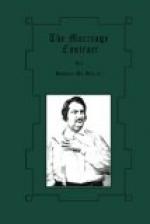Paul would not admit it, but he was at heart delighted to get his liberty. The suspicions which Mathias had put into his mind respecting his mother-in-law were, however, dissipated by this conversation, which Madame Evangelista carried on still longer in the same tone.
“My mother was right,” thought Natalie, who had watched Paul’s countenance. “He is glad to know that I am separated from her—why?”
That “why” was the first note of a rising distrust; did it prove the power of those maternal instructions?
There are certain characters which on the faith of a single proof believe in friendship. To persons thus constituted the north wind drives away the clouds as rapidly as the south wind brings them; they stop at effects and never hark back to causes. Paul had one of those essentially confiding natures, without ill-feelings, but also without foresight. His weakness proceeded far more from his kindness, his belief in goodness, than from actual debility of soul.
Natalie was sad and thoughtful, for she knew not what to do without her mother. Paul, with that self-confident conceit which comes of love, smiled to himself at her sadness, thinking how soon the pleasures of marriage and the excitements of Paris would drive it away. Madame Evangelista saw this confidence with much satisfaction. She had already taken two great steps. Her daughter possessed the diamonds which had cost Paul two hundred thousand francs; and she had gained her point of leaving these two children to themselves with no other guide than their illogical love. Her revenge was thus preparing, unknown to her daughter, who would, sooner or later, become its accomplice. Did Natalie love Paul? That was a question still undecided, the answer to which might modify her projects, for she loved her daughter too sincerely not to respect her happiness. Paul’s future, therefore, still depended on himself. If he could make his wife love him, he was saved.
The next day, at midnight, after an evening spent together, with the addition of the four witnesses, to whom Madame Evangelista gave the formal dinner which follows the legal marriage, the bridal pair, accompanied by their friends, heard mass by torchlight, in presence of a crowd of inquisitive persons. A marriage celebrated at night always suggests to the mind an unpleasant omen. Light is the symbol of life and pleasure, the forecasts of which are lacking to a midnight wedding. Ask the intrepid soul why it shivers; why the chill of those black arches enervates it; why the sound of steps startles it; why it notices the cry of bats and the hoot of owls. Though there is absolutely no reason to tremble, all present do tremble, and the darkness, emblem of death, saddens them. Natalie, parted from her mother, wept. The girl was now a prey to those doubts which grasp the heart as it enters a new career in which, despite all assurances of happiness, a thousand pitfalls await the steps of a young wife. She was cold and wanted a mantle. The air and manner of Madame Evangelista and that of the bridal pair excited some comment among the elegant crowd which surrounded the altar.




